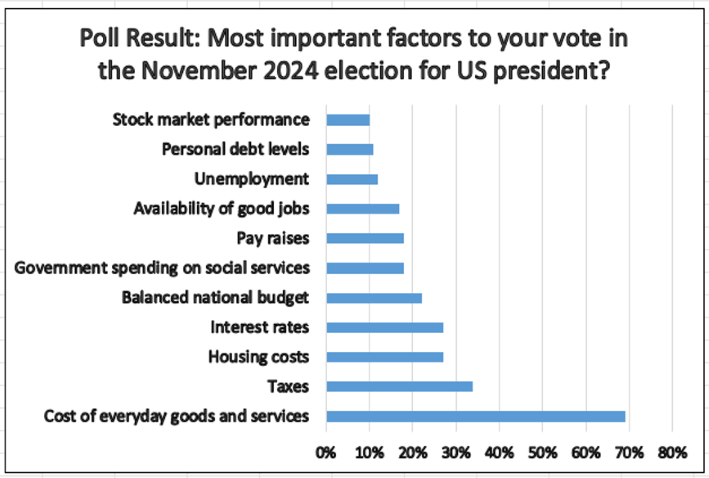My last post addressed the gap between measures of consumer sentiment and US economic performance, in which I summarized research findings supporting the argument that most of the discrepancy was due to faulty economic indicators, not ill-informed consumers (Bolhuis et al, 2024). This post will address what comes to mind when people are asked about the state of the US economy.
According the numerous economists and publications, the American economy is booming (e.g., see here, here, here, here, here, here, and here), yet most Americans polled disagree with that assessment and many say they were better off during the Trump years (e.g., see here, here, here, and here ). What gives?
My progressive friends tend to dismiss these poll results, saying it’s mostly “low-information” Trump supporters who on down on the economy and their opinions don’t matter. That’s because Trump supporters are dumb, deluded and willfully ignorant - per my friends, not me!
Which got me wondering: how do Americans arrive at their opinions of the economy? After much rooting around online, I found this clue:
Source: Board of Governors of the Federal Reserve System, Economic Well-Being of U.S. Households in 2023 (Washington: Board of Governors, 2024), https://doi.org/10.17016/8960
Note how changing perceptions of the national economy mirror perceptions of the local economy, only the national economy is consistently worse. I’m thinking that perceptions of the local economy are likely primary; that is, people extrapolate from what’s nearby to what’s far away (and not vice versa, which would be weird). As for the disconnect between one’s own finances and the local/national economy, that’s probably because “doing at least okay” is hardly the same as “good or excellent”, reflecting an apples and oranges measurement problem.
So what sources do Americans use to assess how their local economy is doing? My first approach to answering this question is to find out what type of economic information matters to people. Apparently, not what’s going on with the stock market:
Source: Board of Governors of the Federal Reserve System, Economic Well-Being of U.S. Households in 2023 (Washington: Board of Governors, 2024), https://doi.org/10.17016/8960
Every single factor in the above chart touches on economic concerns, present or anticipated. I’m going to guess that a lot of Americans talk about their concerns with others: family, friends, neighbors, co-workers, etc. In other words, on a local level, the buzz is full of anger and anxiety about the state of the economy. Who cares about GDP growth when you and many around you are struggling to pay the bills and get ahead?
I doubt, however, that opinions about the U.S. economy stem solely from personal experience and social chatter. Americans still pay attention to the news, as confirmed repeatedly by various surveys. And they still trust the news - at least if it comes from local news organizations. That’s per Pew Research, which conducted a survey of 5,146 randomly selected adults earlier this year. Some findings:
Americans still see value in local news and local journalists. A large majority say local news outlets are at least somewhat important to the well-being of their local community and that their local news media perform well at several aspects of their jobs, such as reporting the news accurately (71%) and covering the most important stories (68%).
Majorities of both major parties say local media in their area are doing their jobs well. For example, roughly three-quarters of Democrats (78%) say their local media do well at reporting news accurately, compared with about two-thirds of Republicans (66%).
Bottom Line: A good number of Americans who say the U.S., economy is performing poorly aren’t so much ill-informed as paying attention to things that are often ignored or downplayed in standard assessments of the economy.
References:
American’s Changing Relationship with Local News/Pew Research. May 7, 2024 https://www.pewresearch.org/journalism/2024/05/07/americans-changing-relationship-with-local-news/
The Cost of Money is Part of the Cost of Living: New Evidence on the Consumer Sentiment Anomaly Marijn A. Bolhuis, Judd N. L. Cramer, Karl Oskar Schulz, and Lawrence H. Summers. NBER Working Paper No. 32163 February 2024. http://www.nber.org/papers/w32163.pdf

